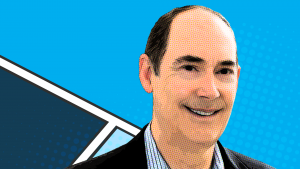Share This
Related Posts
Tags
Changemakers Series
By Nik Edlinger on Jul 9, 2020 in People
Due to COVID, some older adults and their families are hesitant on the idea of assisted living. But in many cases, and especially so for seniors with cognitive impairment, the level of care required for safe aging is only available in a community setting with skilled caregivers.
“At this particular time of coronavirus, we’re working in a very fearful environment, and that’s where a trusting team benefits by the speed of trust,” said Loren Shook, founder and CEO of Silverado. “A lot of unknowns are being faced by people operating communities like ours and across the country.”

Loren Shook
Renowned for their standalone memory care communities, Silverado has pioneered research into programs that drive cognitive improvements for residents in early stages of dementia. The organization is often the top pick for referral partners, and the team is willing to take the most difficult cases.
Silverado’s commitment to care, no matter the challenge, is helping them overcome COVID. And Shook’s willingness to try new things and continually adapt is why he’s been recognized as a Changemaker by Senior Housing News this year.
Read on for excerpts from Shook’s interview with SHN where he discusses the perception challenges posed by COVID, interoperability opportunities with referral partners and the steps Silverado is taking to move forward.
Do you see COVID-19 changing memory care specifically or senior living more broadly in more long-lasting ways?
I think it’s really heightened the awareness of the buyer of services from us, as to asking, what are our systems for infection control and cleanliness? What are our capabilities for understanding changes in clinical condition for people? Then what do we do, if that’s the case?
For some people, they’ll be asking, in a situation like COVID, if there is another pandemic or situation like that, and their loved one gets sick, where do they go? Do you take them back or not? What are your protocols for maintaining as safe an environment as possible, while taking care of the person who has a memory impairment who, unlike an IL or AL individual, isn’t going to be able to stay in their unit because they just simply don’t understand that and it’s not very good for them anyway?
I think it’s going to change the perspective of referral parties. Professionals making referrals, whether they’re geriatric care managers, social workers, doctors, or others, might be a little more discerning in the capability of the operations of whom they’re sending people to. This created a huge amount of fear out there. I think people will look at other alternatives than the larger operators.
We’re going to have to be effective at making the case for them as to why that’s still a good idea.
I imagine you work closely with so many different types of referral partners, behavioral health to hospitals, physicians. Has interoperability been a tech pain point?
That’s the challenge, the interoperability. We’ve implemented Yardi EHR throughout the entire company, and that’s very beneficial obviously, when you’re making the care transitions. Everyone’s working hard to do it. Then we have Homecare Homebase EHR for our hospice company, and the interoperability of these different technologies with systems for marketing and the systems relative to managing the accounting and so on which it is already is very well suited for those things.
Trying to make sure that they work most effectively and getting where we want to get to is, of course, the ongoing effort that we’re all working on, but the connectivity between the hospitals and us and the medical groups and us, that’s a great opportunity yet to be implemented, I think. There’s more to be done there.
The hospitals and the medical groups are evolving. It’s a long process in this evolution for them to realize the value that we bring for them in improving quality of life and reducing hospitalizations and saving the system an enormous amount of money. We’ve had an analysis done of implementing our outcomes from a Medicare point of view, which if they’re implemented, they save billions throughout the country. [Juniper Communities CEO] Lynne Katzmann has also done similar studies and shown similar results. The access to us in the health care systems for the services we deliver is very slow. It’s a very slow go.
There’s a lot of reasons for that, one of which is maybe the payment structures … but then you have a Kaiser, and it absolutely benefits them to work with us. We’re not top of the list even though we work with them in lots of ways. We’re not top of their lists because I think they have more pain points to address than ours at this point. It’s just frustrating that we can’t move faster on that front, but that will come. The day will come when we get to the priority that they focus on the value we bring them, but right now we’ve got a great thing to show and participate with them, and we’re not making as much headway as we’d like.
Read the full interview with Loren Shook of Silverado on SHN.
